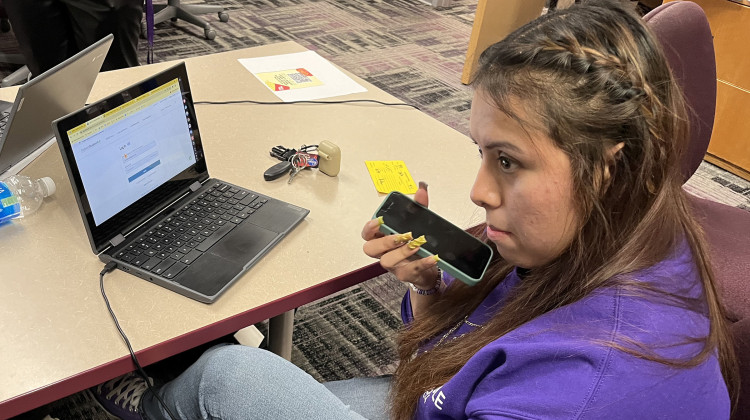
Ben Davis High School senior Isela waits on hold with the federal financial aid hotline Thursday, April 4, 2024 at the school. She needed help completing the new version of the Free Application for Federal Student Aid.
Lee V. Gaines / WFYIHigh school senior Isela has made dozens of calls to the federal financial aid hotline. But last Thursday was the first time she managed to get through to a real person. When she tried to connect her mother to the call, it disconnected.
It was the latest hurdle for Isela, 18, who was one of two students meeting with educators last week during a lunch period at Ben Davis High School in Indianapolis to try and finish the application.
Isela is struggling to fill out the Free Application for Federal Student Aid, or FAFSA, because her mother doesn’t have a social security number.
“It keeps taking me back to the first page saying there's a social security number required,” she said.
WFYI is only identifying students and parents in this story by their first names because of the parents’ immigration status.
The new version of the FAFSA is supposed to make it easier for students to apply for money for college. But the rollout has been beset by months of delays and problems with the system. Students whose parents are immigrants and do not have social security numbers are having a particularly hard time completing the application.
Now, some Indianapolis seniors are still trying to apply for college financial aid as the state’s April 15 priority deadline approaches. State officials strongly recommended students file by then because the aid is provided on a "first-come, first-served basis."
"Even though this is supposed to be easier … for people that don't have social security numbers, it's much harder,” said Isela, who was admitted to the architecture program at Ball State University but cannot afford to go without financial aid. “If I don't fill this out, what is my plan?"
High stakes
Filing the FAFSA is an essential step for students to get college financial aid. It’s used to determine not only federal grant and loan eligibility, but also how much money students can get from colleges and from the state. Indiana’s 21st Century Scholars program, which pays full tuition at public colleges and some tuition at private colleges, requires students to submit the federal application by the state deadline.
The struggle to fill out the FAFSA feels especially high stakes for Indiana high schoolers because beginning this year, the state requires seniors to file the financial aid application or opt out.
FAFSA applications are down significantly across the country with the steepest drops at schools with larger numbers of students from low-income families and students of color. Only about 34 percent of Indiana high school seniors have completed the application for aid this year, according to a tracker from the National College Attainment Network that was updated March 29.
The first problem with the new FAFSA is that it came out months later than usual. Even after it opened, students and parents struggled to create accounts, file the form, and fix mistakes.
“I call it a nightmare, because it's been a horrible challenge for students to complete,” said Kiara Cross, the college admissions coordinator at Ben Davis. “I mean, there's just been roadblock and barrier after barrier for them to get this submitted successfully.”
Time’s up?
The U.S. Education Department has known for months about the issues facing students whose parents do not have social security numbers and it has fixed problems and created workarounds.
Many students have successfully filed FAFSA, said Magin Sanchez, a higher education policy analyst with UnidosUS. But students are still waiting to find out how much money they can get from colleges.
Sanchez said that some families may choose affordable options — like community college — because they are afraid of committing to costly universities.
"You're gonna have students that just run into that issue where time's up, and they have to make a decision," Sanchez said.
Sanchez and others worry that all the delays and problems will lead some families to give up, and some teens to decide not to go to college.
"When you put obstacles up for people — unintentionally, in this case, right — that's going to end up blocking people," he said.
Hispanic or Latino high school graduates already go to college at a rate below their peers. In Indiana, about 43 percent of Hispanic or Latino students who graduated from high school in 2021 went on to college compared with about 53 percent for students overall.
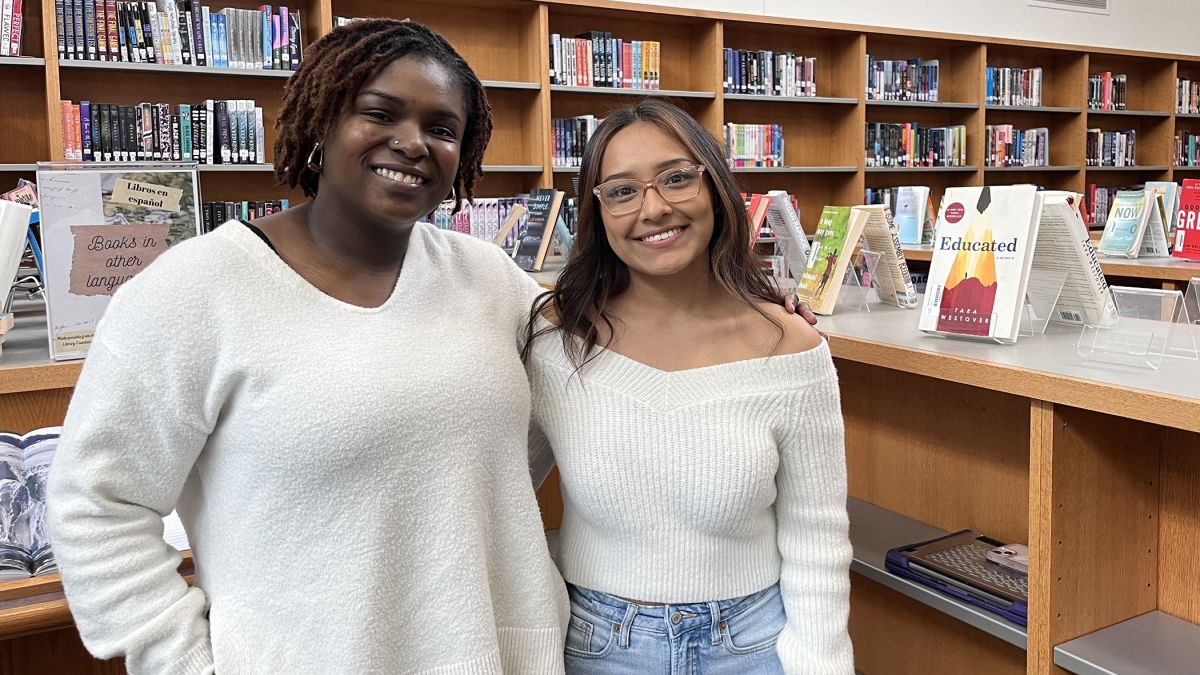
“My biggest concern is that there are going to be students that fall in the cracks,” said Maria Quiroz-Southwood, director of college success for the Indiana Latino Institute.
The Latino Institute works directly with students who are filing the FAFSA. Quiroz-Southwood said the vast majority of them have had problems this year.
One of those students is Jennifer, 18, who tried to fill out the FAFSA as soon as it opened. She quickly finished her portion. But her parents don’t have social security numbers and they were plagued by glitches.
When Jennifer’s family realized the application wasn’t working, "we started to panic because, like, how else were we going to pay for my college?" she said. "I was really scared.”
But a few weeks ago, Jennifer said her mother was suddenly able to create an account and file the form. “It was like a weight off of our shoulders, honestly,” she said. “I think we even went to get ice cream after.”
‘Why even bother?’
With just days to go until the state deadline, families are scrambling to complete the application.
Manuel and his wife don’t have social security numbers. That made their daughter’s FAFSA process confusing.
“I opened the account about two or three months ago and I'm still in the process of verifying my identity,” Manuel said.
Manuel tried to call the federal hotline but he never reached a real person, he said.
In early April, Manuel made a last ditch effort. He took a day off work to go to a FAFSA completion event at Lawrence Central High School. “We don't know what else to do,” he said.
For most of the process, Manuel’s daughter Shecid said she felt defeated. Only the state’s new FAFSA requirement keeps them pushing to finish, she said.
“It's like, why even bother? I already am going to community college,” said Shecid, a senior. “For me, it just seems complicated, especially because my parents couldn't get in and so it does make me worried.”
Back at Ben Davis High School, Isela and her mother finally got through to someone on the FAFSA helpline. They talked her mother through a workaround to create an account. It was a huge relief.
Isela plans to go to Ball State University this fall.
Contact WFYI investigative education reporter Dylan Peers McCoy at dmccoy@wfyi.org. Contact WFYI investigative education reporter Lee V. Gaines at lgaines@wfyi.org. Rachel Fradette is the WFYI Statehouse education reporter, contact at rfradette@wfyi.org.
 DONATE
DONATE




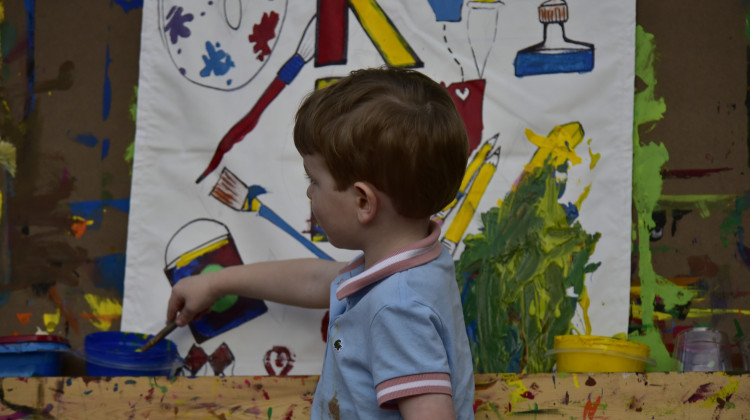
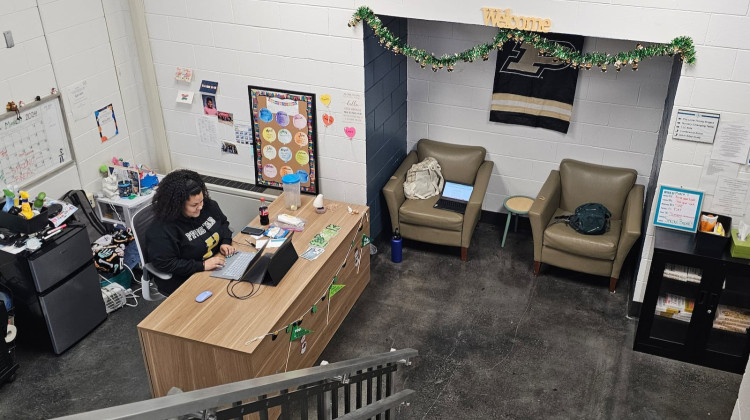
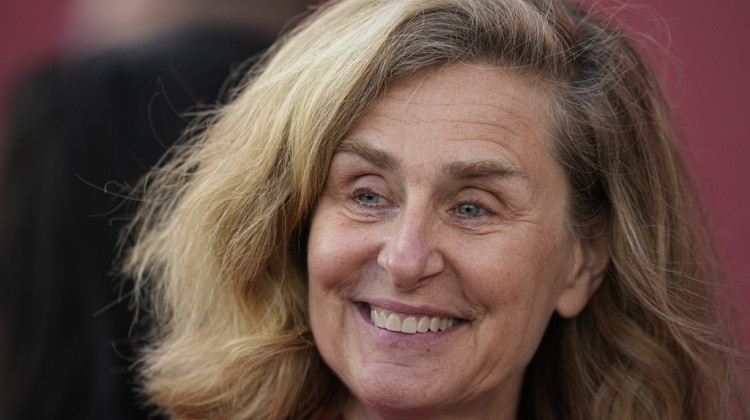

 View More Programs
View More Programs

 Support WFYI. We can't do it without you.
Support WFYI. We can't do it without you.